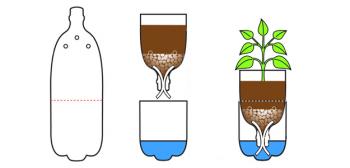The student (and those of us on a student budget) diet is famously known for the staples of Kraft Dinner, ramen noodles and bags of frozen perogies that only cost a few bucks.
But imagine your mac and cheese spiced up with some fresh hot pepper or a nice kale salad to complement your ramen. Heck, how about just some nice herbs to liven up your frozen food? It’s entirely easy and possible to grow these fresh foods no matter how little space you have.
Artist and gardener Samantha Lefort was living in a tiny Vancouver apartment when she decided she wanted fresh food 24/7, 365 days a year. “I didn’t have access to a balcony or a community garden … I wanted something that was fresh and as close to the soil as I could get it.”
The importance of truly fresh herbs, vegetables and fruit can’t be understated. “As soon as you pick any fruit or vegetable from the stalk, it starts to lose a good portion of its nutrients.”
Produce from the grocery store has to travel hundreds of miles before we can buy them -- by the time we do, a lot of nutrients are gone. “Eating food that as close to the ground as possible as soon as it is picked is healthier for you.”
When getting started, Lefort recommends only starting with the food you actually want to eat. “Use stuff that’s simple -- herbs are the best thing to start with because you can use them a lot and you get used to interacting with them in your kitchen space or dorm space.”
Herbs like mint grow like weeds so they don’t need a lot of support to get going -- they also allow you to make delicious and fresh mojitos. You can also purchase starter herbs that allow you to get a head start on growing instead growing right from the seed.
The Internet is a treasure trove of gardening information.
treehugger.com, letspatch.tumblr.com and victorygardensvancouver.tumblr.com all have great information on container gardening.
Lefort was kind enough to give The Lance a primer on how to grow our own herbs and veggies quickly and easily in simple containers that can be made from found objects.
CONTAINER GARDENING: HOW TO
This guide will help you build a self-watering water bottle container to grow herbs in.
You need:
-
a bottle with a spout
-
soil
-
some rocks
-
a piece of cotton or water absorbent fabric (it needs to
plug the hole of the spout) -
seeds, or an herb starter
Step 1: Cut the water bottle about ¼ from the bottom so that the planting area is larger than the water reservoir
Step 2: Place your fabric through the spout and tie a knot in the side that will make up the planting area (This is so soil doesn’t breach through!)
Step 3: Put some drainage rocks in the bottle all around the fabric -- this provides drainage and stops the soil for mixing with the water.
Step 4: Add soil and seeds (seeds should be planted just a fingernail length in the soil). Add some water into the reservoir area. You can also buy a plant starter -- this plant is already alive and growing, you just have to keep it healthy.
Step 5: Once all these steps are complete, water the plant once from the top -- after that, the plant will get all the water it needs from the water reservoir.
This article and graphic originally appeared on The Lance and are reprinted here with permission.




Comments
Do
Don't